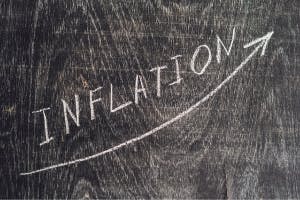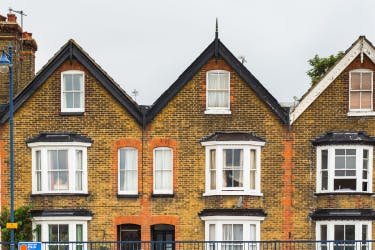What are mortgage interest rates and what are current interest rates?
What are mortgage interest rates, what is a good rate and how do you get the best deal? In this guide, we’ll walk you through all you need to know about mortgage interest rates, to help you work out what is the best option for you.
In this guide
- What is a mortgage interest rate?
- How does mortgage interest work?
- What is the current mortgage interest rate?
- What is a fixed rate mortgage?
- What is a variable rate mortgage?
- What is a base rate tracker mortgage?
- What is a standard variable rate mortgage?
- What is a discount variable rate mortgage?
- What is a good mortgage rate?
- How can I get the best interest rate?
- Which mortgage rate should I choose?
What Are The Different Types Of Mortgage Loans?
What is a mortgage interest rate?
A mortgage interest rate is the rate of interest your mortgage lender charges you for borrowing money from them to purchase a home. Borrowing money from a lender allows you to buy a home sooner by making up the remaining house price after your deposit. The lender then makes money by lending you the money through interest. The rate of interest you’ll be charged can depend on a number of factors, such as the amount you borrow, the size of your deposit, the type of mortgage you get, your credit history and the offers your lender has available.
How does mortgage interest work?
Mortgage interest is calculated as a percentage of what you borrow, which is why you pay more interest at the start of your mortgage term because your loan size is larger. Each month, you'll make a repayment to your lender which pays off some of your loan as well as the interest.
When you first take out a mortgage, you'll select a mortgage deal that's either a fixed rate, or variable rate (we'll go into the differences between them below), for a set number of years - normally between 2 to 10 years.
At the end of that period, you'll either automatically move onto your lender's Standard Variable Rate (also known as an SVR or follow-on rate), which is typically much higher, or move onto a new fixed or variable rate deal. This is known as remortgaging.
You'll keep repeating this process until you finish your mortgage term and your loan is all paid back, normally after 25-35 years.
You can use a Mortgage Calculator to get an idea of how much you could borrow for a mortgage, and what your monthly costs might look like.
What is the current mortgage interest rate?
The Bank of England's base rate of interest currently stands at 4.75%. This influences UK mortgage interest rates, which are now averaging between 5.26%-5.48% for 2-5 year fixed rate deals. However, what you'll be offered depends on your affordability, your LTV, and whether the mortgage market becomes more stable. For example, for borrowers with a 10% deposit, the best five-year rate available from our lender panel is 4.59%, significantly less than the market averages!
When trying to navigate a volatile mortgage market, it’s always best to seek expert advice. At Tembo, our award-winning team of mortgage brokers are experts in helping first-time buyers and remortgagers find the best deal for their situation, taking the current market into account.
*Based on 90% LTV, with a 35-year mortgage term. Interest rates are accurate as of January 2025.
See what you could afford today
Discover your true buying budget with a free, personalised Tembo recommendation. Our smart decisioning tech will find all the ways you could boost your buying budget, so you could get on the ladder sooner.
What is a fixed rate mortgage?
A fixed rate mortgage is a type of mortgage where you’ll be offered a set rate of interest for a certain number of years. This is known as the ‘term’. Your mortgage term may be 2 years, 3 years, 5 years or even 10 years, but you won’t always get this much choice. The terms available to you can sometimes be dictated by your mortgage affordability, the lenders’ criteria and the deals they have on offer.
The best thing about fixed rate mortgages is that while you have one, your interest rate won’t increase — no matter what the rest of the market is doing. It doesn’t matter if the Bank of England increases its base rate, or your lender increases its standard variable rate (SVR) because you’re locked into an agreement. This means you know exactly what will be coming out of your bank account each month for the duration of the term.
A fixed rate mortgage can be ideal if you’re looking for stability and you want to know exactly how much your mortgage payments will be. But sometimes a variable rate mortgage can be the smarter choice.
What is a variable rate mortgage?
A variable rate mortgage is a type of mortgage where your interest rate won’t be fixed, so your mortgage payments may rise and fall from one month to the next. A variable rate mortgage may sound scary in comparison to a fixed rate mortgage, but they can sometimes work out cheaper. Fixing your mortgage could see you paying over the odds if rates fall later on in your term.
For example, you might fix your mortgage at 5% because you’re worried about further increases, only for rates to fall and 4% deals to become available. That 1% can make a big difference over the course of your mortgage. When you fix your mortgage, you essentially pay a premium for the benefit of knowing how much your repayments will be.
There are sometimes variable rate mortgages available with no early repayment charges. So if fixed rate deals are high due to market uncertainty, you could stay on the variable rate while it’s significantly lower than a fixed rate, and move over to a fixed deal once the interest rates look more appealing. This is just one example that proves there is more choice than people realise when taking out a mortgage!
If you’re unsure how long to fix your mortgage for, we can help. In our guide, we walk you through what to consider when choosing between fixed and variable rate mortgages, and how long to fix your mortgage for. Or use our Mortgage Rates Comparison tool to compare live rates from our panel of over 100 lenders for fixed rate, tracker and discount mortgage deals.
There are different types of variable rate mortgages including:
- Base rate tracker mortgages
- Discount variable rate mortgages
- Standard variable rate mortgages
What is a base rate tracker mortgage?
A base rate tracker mortgage is a type of variable rate mortgage which tracks the Bank of England’s base rate, though it won’t necessarily match it. If the base rate rises, your interest rate (and therefore your repayments) will rise too. If the base rate falls, your interest rate and repayments will follow.
For example, you might have a tracker mortgage that moves at 1% above the Bank of England’s base rate. If the base rate is 2%, this means your interest rate will be 3%. If the base rate falls by 1%, your interest rate will do the same.
Read more: What happens when interest rates rise?
What is a standard variable rate mortgage?
A standard variable rate (SVR) mortgage is a rate set by a mortgage lender. All mortgage providers set their own standard variable rate. SVRs are often influenced by the Bank of England base rate, but don’t track the base rate at a set percentage, which is why they are different from tracker mortgages.
Normally, you are moved onto your lender’s standard variable rate once your fixed rate, tracker rate or discount rate mortgage term comes to an end. It’s worth noting that interest rates on a standard variable rate mortgage are often much higher, so when your fixed rate, tracker rate or discount rate mortgage comes to an end, it’s worth looking around to see what deals are available.
What is a discount variable rate mortgage?
A discount variable rate mortgage is where your mortgage interest rate is set at an amount below your mortgage lender’s standard variable rate (SVR), for a set period of time. Your interest rate is not fixed however, but it will go up or down in relation to the lender’s SVR.
See today's best mortgage rates
See the latest mortgage interest rates from across the market, including all of the large high-street banks and specialist lenders that you might never have heard of.
See our rates





What is a good mortgage rate?
A 'good' mortgage interest rate is typically between 4-4.5%. However, whether mortgage lenders are offering rates between this range depends on the current market. At the moment interest rates are high, with two-year and five-year fixed rate deals averaging between 5.26%-5.48% for 2-5 year fixed rate deals. This is due to the Bank of England keeping the base rate high to bring down inflation. This is turn influences the interest rates offered by other banks and building societies on savings accounts and loans like mortgages.
The mortgage market can be fast-paced and things change very quickly, so these interest rates will likely not stay the same for long. In fact, lenders often change their available rates multiple times a month. For an up-to-date round-up of the best deals, take a look at our Interest Rate Tracker or create a free, personalised mortgage recommendation.
Top Tip
When choosing between different mortgage rate types, it's always best to get advice from an expert, like a mortgage broker, to work out the best option for your individual situation.
How can I get the best interest rate?
Here are a few ways to get the best interest rate. Shaving a percentage point (or even half a percentage point) off your mortgage might not sound like a big deal, but it could save you a lot of money over your mortgage’s lifespan.
1. Check your credit report
Your credit history tends to have a significant impact on the interest rates available to you. Mortgage lenders often reserve the best deals for borrowers with a good track record of paying their debts on time. Whereas if you’ve struggled with debt in the past, lenders may charge you a higher interest rate. That’s their way of protecting themselves and reducing the risk involved.
Before applying for a mortgage, check your credit report to make sure everything is accurate and up-to-date. Take a look at our guide to credit scores to find out how to improve yours.
2. Put down a bigger deposit
It’s easier said than done, but putting down a bigger house deposit can often help you access a better interest rate on your mortgage. If you put down a deposit of just 5% or 10%, you’ll usually pay a higher interest rate than you would if you put down a deposit of 20% or more.
Struggling to save a deposit by yourself? Fear not because here at Tembo, we’re experts when it comes to helping those with low deposits.
If you have a family member who owns their home, a Deposit Boost could be the answer. By remortgaging their property with the help of Tembo, they could release equity for you to use as your deposit.
Family springboard mortgages are another option. Instead of using a family member’s property to get you on the ladder, you use their savings. But rather than gifting you a deposit in the traditional sense, they’ll put their savings in a special account provided by the lender.
If you pay your mortgage on time each month, your family member will get their savings back, plus interest. If you’re unable to repay your mortgage, the lender will be able to use your helper’s savings to cover the shortfall, though this is usually a last resort.
3. Use a mortgage broker
Using a mortgage broker is one of the best ways to find the right interest rate for you. They’ll compare hundreds of lenders and mortgages from across the market, saving you time, effort and money. In fact, here at Tembo we work with over 100 lenders to find the best mortgage scheme for you.
Some lenders offer broker-only deals that you can only access if you go through a mortgage advisor. These deals can’t be found on price comparison websites and even if you approach the lender directly, you won’t be able to access them.
To find out what options are available, create a recommendation on our homebuyer platform. This is completely free, takes only a few minutes and there’s no credit check involved. At the end, you’ll get a personalised recommendation of what you could afford, with indicative interest rates.
Which mortgage rate should I choose?
Well, since everyone has their own financial situation, goals, and attitude to risk, what’s best for one person won’t be what’s best for another. If you are risk-adverse, or want to know exactly what your mortgage payments will be each month, a fixed rate mortgage may be a better option.
While if you are happy for your mortgage payments to be different each month, it might be better to go for a variable rate mortgage as these usually offer lower interest rates than fixed rate deals.
To find out whether a variable or fixed rate mortgage is right for you, get in touch with our team today. We’re experts when it comes to helping first time buyers and existing homeowners find the right deal.
Discover what you could afford with Tembo
Our award-winning team of mortgage brokers specialise in helping buyers boost their budget. See how much mortgage you could afford by creating a recommendation today. You'll get a personalised recommendation with indicative interest rates and repayments, with no credit check involved.



